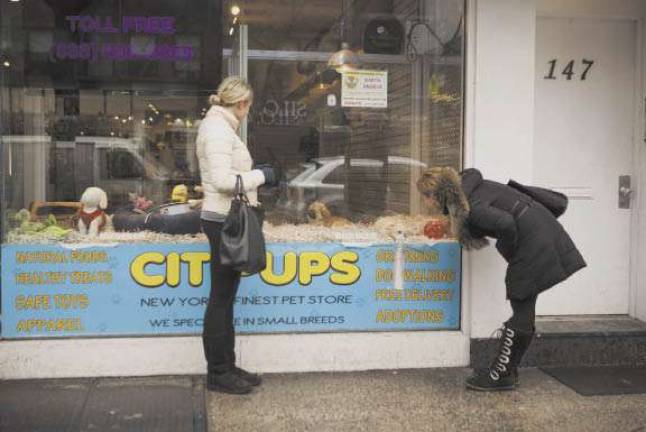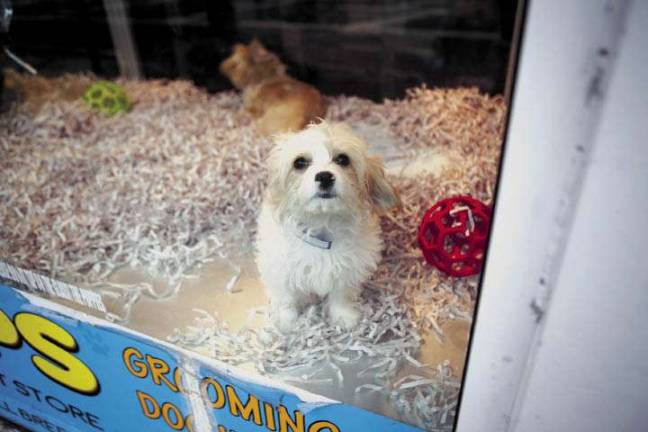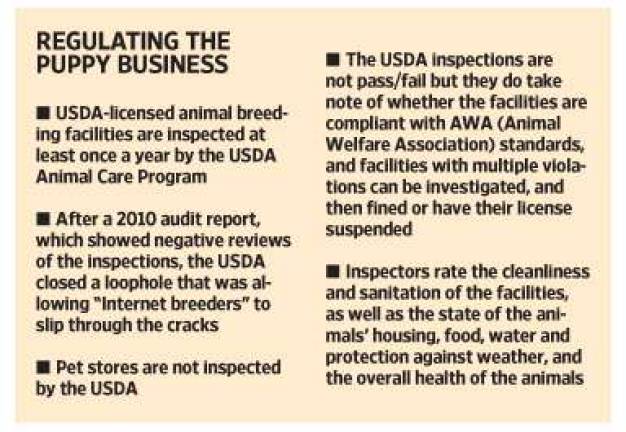That Doggie In the Window



A state ban on puppy mills makes life uncomfortable for Manhattan pet stores
Every Thursday night, the protestors line up in front of CitiPups in Chelsea, handing out fliers to passersby, their chants of "Stop Puppy Mills" drowning out the faint barks of the puppies romping in the window. This small band of protestors has been demonstrating, pretty much every week, in front of CitiPups for almost two years, claiming it has evidence that the store gets its dogs from puppy mills.
CitiPups, in turn, has sued the protestors, claiming defamation and slander, saying the weekly vigil hurts business. "They thought I was just going to roll over and dance for them, but I will not sit back and let these people lie about us," said David Jacoby, the manager of CitiPups. "Look, we hate puppy mills, too."
The battle in Chelsea ? pitting store owners who claim they are doing the right thing against protestors convinced they aren't ? could soon multiply across the city, thanks to legislation recently passed in Albany. The puppy mill bill, signed by Gov. Andrew Cuomo and co-sponsored by Assembly Member Linda Rosenthal, would allow local municipalities to regulate pet dealers, meaning that New York would have more teeth to crack down on pet stores.
First, though, both sides need to agree on what constitutes a puppy mill ? a definition that isn't entirely clear-cut. According to the ASPCA, the definition of a puppy mill is "a large-scale commercial dog breeding operation that places profit over the well-being of its dogs-who are often severely neglected-and acts without regard to responsible breeding practices."
Photos circulating on the Internet, playing on Humane Society commercials and plastered on protestors' poster boards show dogs' legs with flesh rotted to the bone and sickly puppies recently freed from shut-down facilities. But what about a breeder like Donna Dailey who supplies dogs to New York pet stores like CitiPups, and according to USDA inspections (the agency overseeing pet farms), has had zero violations in the past three years, despite having over 100 dogs and puppies at her facility in Missouri? She may have passed the tests of the inspectors, but her facilities are unquestionably large-scale.
Jacoby at CitiPups says he is in touch with other pet stores in the city about their breeders, and claims to know where at least 75% of the puppies are coming from. "And it's not puppy mills, these are reputable breeders," he said.
Dana Derraugh, who owns the Chelsea Kennel Club and used to be co-owner of Le Petit Puppy on Christopher Street, echoed that view, claiming that most pet stores in New York get their dogs from reputable and ethical breeders. "Just because I'm a pet shop doesn't mean I'm a puppy mill," said Derraugh, whose own yorkie was her bridesmaid for her second marriage. "After 30 years in the business, I can smell a puppy mill from a distance. Healthy puppies are happy, plump and bright-eyed. Pet stores are safe, and it's actually usually people who buy from online breeders who are in trouble."
Michael Feldman, an organizer of the weekly protests at CitiPup, doesn't buy it. "In New York City, I would say 100 percent (of the pet shops) get their dogs from puppy mills, and probably 99 percent nationwide," said Feldman. "In puppy mills, dogs are forced to breed two or three times a year, and they don't care whether the puppies are healthy or not because it's a for-profit industry. Pet stores are in the business of selling puppies as products."
Despite pet-store contentions that their dogs come only from reputable breeders, there nevertheless are dozens of negative Yelp reviews online for pet shops across the city, including CitiPups and Chelsea Kennel Club. "They assured me the pups were not from puppy mills but now I am convinced I was LIED to!" says one CitiPups reviewer. A Chelsea Kennel Club reviewer said, "The vet cleared this dog for sale for the pet store owner, and now we are dealing with having a sick dog and a $4,000 surgery that we may have to pay for."
When asked about these negative reviews, Jacoby said puppies, like people, can get sick, no matter where they come from. Derraugh had a similar take on the negative reviews. "If the dog gets sick, it doesn't make him a puppy mill. It's a natural thing that they get sick, because puppies are fragile," she said.